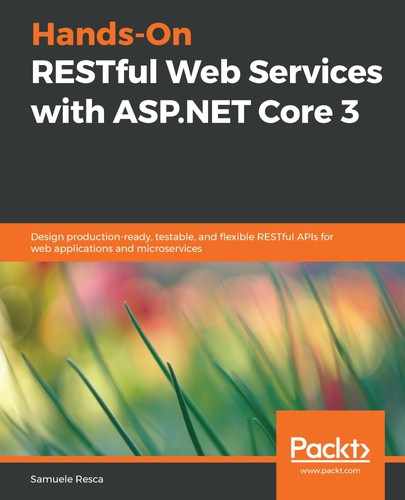Docker provides a lot of ways to specify the environment variables of a container. In the docker-compose.yml file specified earlier; we use the env_file approach. Furthermore, we can proceed by creating the api/api.env file in the corresponding path specified in the definition of the catalog_api container:
ASPNETCORE_URLS=http://*:5000;https://*:5001
ASPNETCORE_ENVIRONMENT=Integration
The file syntax expects each line in the file to be in the following format: VAR=VAL. In the preceding case, we are defining the environment variables used by ASP.NET Core to run the service: the ASPNETCORE_URLS variable specifies the URLs used by the web service and ASPNETCORE_ENVIRONMENT specifies the environment name used by the application. In the same way, we should also proceed by defining the db/db.env file in the corresponding folder:
SA_PASSWORD=P@ssw0rd
ACCEPT_EULA="Y"
In this case, the file defines the corresponding variables for the SQL Server container: SA_PASSWORD specifies the system administrator account password, the ACCEPT_EULA needed by the startup process of SQL Server.
In addition to this, docker-compose supports declaring default environment variables in the .env file. The file must be placed in the same directory as the docker-compose.yml file. The file contains some simple rules for defining environment variables. Let's create a new .env file in the root folder of the catalog service directory:
COMPOSE_PROJECT_NAME=store
The COMPOSE_PROJECT_NAME variable is a reserved variable of the docker-compose command provided by Docker. It specifies the project name to use to run the containers. Therefore, both the catalog_api and catalog_db containers will run under the same project, called store.
